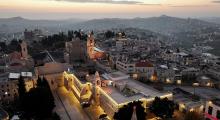Issued by the Catholic Center for Studies and Media - Jordan. Editor-in-chief Fr. Rif'at Bader - موقع أبونا abouna.org

Pope Francis’ upcoming visit to Iraq is timely. It will take place at time when the Christian Iraqis seek divine help that will extricate them from the embroglio they are suffering from, as well as ensure them a peaceful and a dignified life.
His Holiness Pope Francis’ trip to Iraq will serve as an encouragement and direct a message of hope to the Christian Iraqis who have been tested on their faith all down the centuries. Though they are a minority, they are not abandoned, and the fact that Pope Francis is going now in such a difficult time is going to give them hope. The Christian Iraqis have suffered terribly, and this visit will definitely address and heal their deep scars.
It is dolorous to note that the hemorrhaging of Christians from the Middle East, particularly from Syria and Iraq, caused by wars and persecution, is proceeding at a high rate. Reports predict that if the rate continues as such, the region will be bereft of its Christian component, which eliminates a key factor of diversity as well as inflicts serious and irreversible damage.
What adds insult to injury are the reports that have leaked indicating that hundreds of thousands of Christians are trying to leave Lebanon in the wake of August 4, 2020 explosion, which raises fears for the future of the Church there.
In a recent interview with Fr. Jad Chlouk, parish priest at Beirut's Maronite Cathedral of Saint George, he said that the Christians feel alienated from their homeland with "statistics showing that more than 380,000 requests for immigration were presented to the embassies of the EU and countries of North America, and that most of them were Christians who unfortunately now feel like strangers in their own home country.''
With the predictions that the number of Christians in Lebanon is rapidly decreasing, this may cause pressure for those who remain and it negatively affects the whole Christian community, because it is destined to lose the young people who control the future and bring acceptable solutions to all complicated problems.
The diminishing number of Middle East Christians has negative impacts since they are an essential part of Middle Eastern history and culture, and they continue to contribute powerfully to society, particularly in the fields of education, medicine, science and engineering. Furthermore, this damages the fabric of societies and negatively impacts upon their economies.
In the Middle East, the Church will probably come under severe pressure with the Christians facing increased marginalization, though their presence in the region dates back two millennia. They are choosing to leave in a desire to ensure a more certain future for their families.
Before 2011, Christian Syrians comprised around 8-10 per cent though 40-50 per cent of them have since left. Meanwhile, there were approximately 1.5 million Christians in Iraq before 2003, but estimates now range from 200,000 to 500,000.
In several countries Christians face increasing marginalization, so whoever has the ability to leave is leaving. Furthermore, the Christians have a greater sense of insecurity, thus they look for other countries where they are secure.
As the Christians feel insecure ad marginalized in their own countries they emigrate leaving behind an important and impressive vacuum that can never be filled.
The Middle East Christians have been serving as a key factor of stability, enlightenment in the societies where they live, and played major roles in the progress of their societies in various fields. The most prominent fields include education, culture and arts, social affairs, politics, economics, humanitarian assistance and religious activities. The Christian schools are widely acclaimed as the best and most desirable educational institutions.
The Christian missionaries launched the first ever educational institutions in the region including schools and universities. These educational institutions refined their respective societies and entrenched a culture of modern civilization. Another field to mention is the field of health where the Christian missionaries built hospitals and health centers that helped heal the ill supplemented by divine wishes of quick recoveries. These services are the cornerstone for the advancement of societies.
When will justice, peace, and respect for common living prevail so that all people can join hands in the process of the development of their societies as well as in creating a better future for the generations to come?







